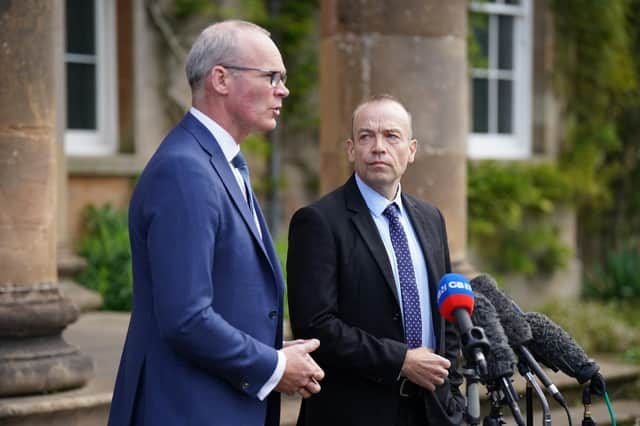Owen Polley: Substance of any protocol deal more important than the fact of getting one


To reach this new position, the government, which previously seemed to be resolute on what it could and couldn’t accept from any potential deal, has apparently softened its position. That creates fresh anxieties for many unionists, who were largely supportive of the Northern Ireland Protocol Bill and the idea of solving the main problems with the Irish Sea border through parliament.
As the former UUP chairman, David Campbell, wrote last week, there are reasons to be optimistic about Northern Ireland’s future in the UK.
Advertisement
Hide AdAdvertisement
Hide AdQueen Elizabeth’s death and the King’s succession showed that our allegiances to Britain’s institutions remain powerful, even though they are usually expressed quietly and subtly. The census confirmed that Northern Ireland’s place in the UK is still in line with the identities that most people here feel and the documents that they choose to hold.
Every region has its problems, but Northern Ireland, and the UK more generally, are pretty good places to live.
Although these things are positive and constructive, the protocol continues to damage relationships, destabilise institutions and compromise our constitutional position. There are many reasons for unionists to be upbeat, but they cannot ignore this virus that, if it is allowed to persist without major reform, will eat away at our place in the UK over years and decades to come.
It’s encouraging, to a point, that the EU is still talking to the government about the protocol, despite Brussels’ repeated insistences that it could not be changed. It implies that the bloc recognises, at some level, that the arrangements it imposed were unreasonable.
Advertisement
Hide AdAdvertisement
Hide AdAt the same time, there are many reasons for unionists to be concerned.
The media has reported that the ‘mood music’ between the UK and the EU has improved in recent weeks. There’s nothing wrong with old-fashioned diplomacy, but some of this improvement seems to have happened because government figures have been obsequious to Dublin, while Truss’s administration also hinted that it might start erasing important ‘red lines’.
Previously, the prime minister suggested that any negotiated settlement would have to “deliver all of the things we set out in the Northern Ireland Protocol Bill”. The language her ministers have been using recently is more compromising.
Former Northern Ireland minister, Conor Burns, who was until Friday at the Department for International Trade, said that there was a potential ‘way through’ if the EU recognised that goods from Great Britain that stay in Northern Ireland “should be treated differently to those goods which are going into the single market”.
Advertisement
Hide AdAdvertisement
Hide AdHe went on to say that Brussels needed to “recognise the legitimacy of the UK’s internal market on a par with the EU’s single market”. That seems to imply that British goods staying here would not be subjected to paperwork, tariffs, checks or any other requirements that would not apply to goods arriving from the single market.
There was no mention, though, of ensuring that British courts would be the ‘ultimate arbiters’ of protocol disputes, guaranteeing that all UK tax laws could be enacted here or making sure that the same rules applied nationwide on state aid. These are some of the problems that could cause Northern Ireland to be pushed ever further from the GB.
Perhaps the government remains as determined as ever to achieve its stated aims, but it’s taking a more conciliatory approach to get the discussions started.
Last week, Burns’ successor, Steve Baker, told an RTE presenter that the UK would go into negotiations without ‘red lines’. But, in response to an article I wrote about that position the Northern Ireland minister tweeted that the point was “not to discuss them (the red lines) in public”, implying that there were still limits to what the government would accept.
Advertisement
Hide AdAdvertisement
Hide AdWe must hope so. The two sides are going into the overheated environment of a ‘negotiating tunnel’, to use Mr Baker’s phrase. There will be enormous pressure to reach an agreement, and, from previous experiences, we know the UK is usually more desperate to close a deal than the EU.